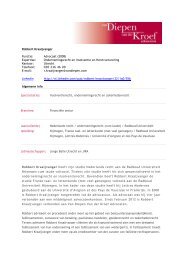© Van Diepen Van der Kroef Advocaten
© Van Diepen Van der Kroef Advocaten
© Van Diepen Van der Kroef Advocaten
- No tags were found...
You also want an ePaper? Increase the reach of your titles
YUMPU automatically turns print PDFs into web optimized ePapers that Google loves.
acceptance of the status of the defendant as a party to the proceedings (see J.Spiegel, Vreemde states voor the Netherlands Court, thesis 2001, page 31);3. the logical or<strong>der</strong> of legal reasoning. It is not possible to grant leave to proceed indefault of appearance where the jurisdiction to do so is absent.24. Even the State of the Netherlands recognises un<strong>der</strong> points 3.2 et seq. of the motion at firstinstance that an ex officio review of the issue of jurisdiction must take place (against a nonappearinginternational organisation). The result of that ex officio review is given with thegrant of leave to proceed in default of appearance, which is a correct result, in the view ofthe Association et al. Given the above the State of the Netherlands should have beendeclared non-suited in its interim motion, alternatively that motion should have beendismissed.25. Furthermore, it is incomprehensible that the District Court has held that the Court, ingranting leave to proceed in default of appearance, did not give a judgment on itsjurisdiction. That consi<strong>der</strong>ation is at odds with the correspondence cited above on the issueof jurisdiction, the settled practice of the UN and known to the District Court regardingappearance in legal proceedings, the cited literature, as well as the incomprehensibleassumption that a decision on granting leave to proceed in default of appearance could begiven where no jurisdiction exists. The fact that a decision is given regarding leave toproceed in default of appearance does not entail – contrary to what the District Court held –that no decision is given on the Court’s jurisdiction.The reference to the docket (which lacks any grounds stated for a decision regardingjurisdiction) is in this respect insufficient without further grounds being given, and they areabsent. The docket lacks any space for such grounds regarding the issue of jurisdiction. Asstated above, leave to proceed in default of appearance implies Jurisdiction. In thisconnection the Association et al. points out that the docket also contains no consi<strong>der</strong>ationsregarding, for example, the validity of the writ of summons. The grant of leave to proceedin default of appearance here says enough. At the very least it has the semblance that theDistrict Court was guilty of following a line of reasoning to a result, which is insupportable.Ground of appeal 426. The District Court has reasoned erroneously un<strong>der</strong> legal consi<strong>der</strong>ation 5.3 of the contestedjudgment.<strong>©</strong> <strong>Van</strong> <strong>Diepen</strong> <strong>Van</strong> <strong>der</strong> <strong>Kroef</strong> <strong>Advocaten</strong> page 12 of 99
















